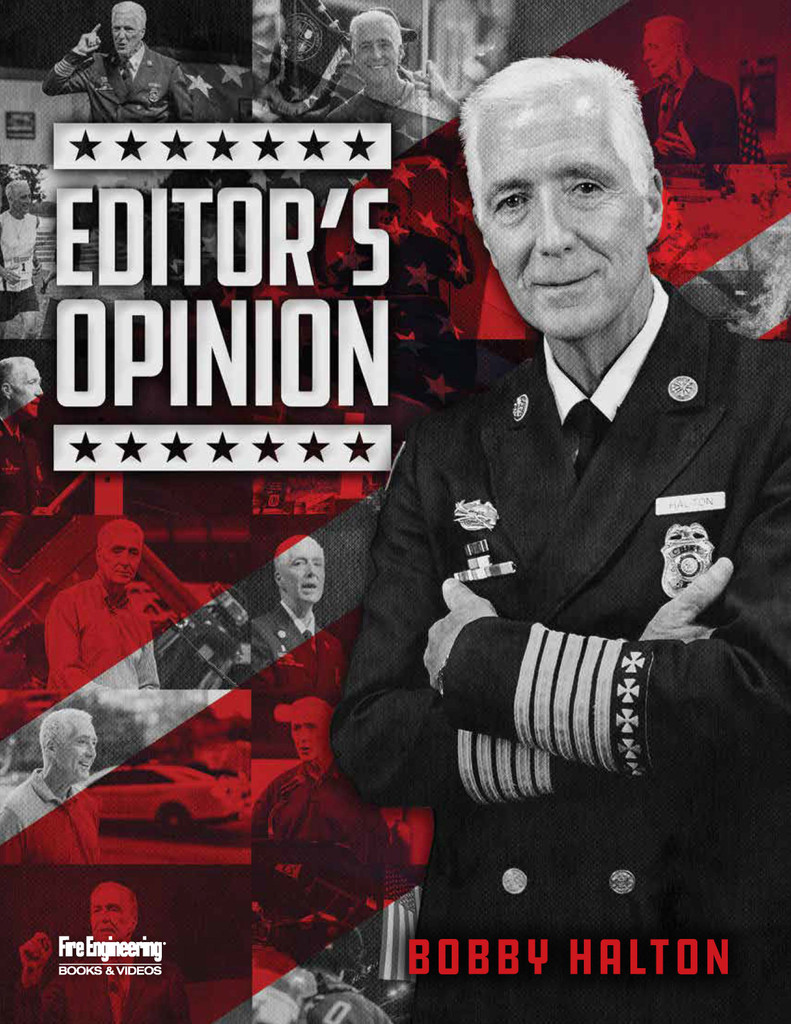May 31st 2024
Excerpt: Editor's Opinion
Book By Chief Bobby Halton
In the Highest Traditions of the Fire Service
The life of the firefighter is a contradiction. Although, like all people, we firefighters fear a violent death, we are, however, at the same time willing to risk it to achieve our mission’s highest calling: saving another’s life. Like all people, we want to be happy and enjoy our families, but yet we are willing to sacrifice time with our loved ones to serve strangers. As firefighters, we are dedicated to the relentless perfection of our craft and strive endlessly to maintain our best physical and mental condition while at the same time recognizing the value and strength of our teams and our teammates.
Jay Jonas, a battalion chief in the Fire Department of New York (FDNY), was a captain on 9/11. Jay vividly recalls that day: He remembers standing in the lobby of the North Tower, the first tower that was hit, when the second plane hit the South Tower. He remembers there were groups of firefighters standing there who said, “This could be our last day here, fellas; it’s been good working with you!” They stood around and shook one another’s hands for a few moments, telling each other how much they enjoyed working with one another and good luck.
Jay understood, and he said it very well: “We knew we were in mortal danger, but we disregarded it.” They disregarded it because there were still people trapped in that building and they had no intention of leaving anyone behind. Jay recalls that he and his crew ran into Captain Patrick (Paddy) Brown in that lobby. Paddy said to Jay, “They’re just gonna send you up, so there’s no point in checking in at the command post,” but Jay felt compelled to go to the command post and check in anyway.
At the command post, Jay was told to take his crew up to the target floor where the plane had impacted the building. Jay and his crew began ascending the building, stopping every 10 floors to catch their breath and rearrange their gear. They made it to the 27th floor when they felt the collapse of the South Tower. Jay sent another captain to look out the windows on the south side of the building, and he looked out on the north. Jay recalls being able to see nothing except thick white dust up against the windows, but the other captain came back and told Jay that the South Tower was gone.
They then realized that thousands had just lost their lives and that among those thousands were many of their friends. Jay and his crew heard the order to descend, so they began their descent of the North Tower. On the 23rd floor, the crew ran into a woman named Josephine. She was in great distress and crying, complaining that she could not descend the stairs because of her health and the pain she was experiencing trying to navigate the stairs.
One of Captain Jonas’s crew, Tommy Falco, asked him, “What are we gonna do?” Jay said, “We can’t leave her behind,” so to the firefighters propped Josephine between them and began down the stairs. Everyone on the crew knew that carrying Josephine down would greatly slow their descent and put them at tremendous risk, but they had no intention of leaving anyone behind. When they reached the fourth floor, a business floor, they decided to try to find a chair in which to carry Josephine. Finding none, they returned to the stairwell; suddenly, they felt the building collapsing around them.
Surviving the collapse and collecting themselves, Jay and his crew got on the radio and called a Mayday. Firefighters outside answered the call and told Jay that they were coming for him; they would not leave him and his crew behind. Jay and his crew thought that others must be hurt worse than they, so he asked why all the attention was being focused on them. They were then told that they were the only ones the rescuers were talking to on the radio.
It was at that point that Jay remembered hearing a radio transmission. Jay recalled hearing Chief Hayden order everyone to evacuate the building. He remembers hearing Paddy Brown respond. Paddy, a decorated FDNY firefighter, two-tour Vietnam vet, boxer, yoga instructor, and all-around Renaissance man, was the captain on Ladder Three that day. Jay recalls vividly hearing Chief Hayden call out on the radio, “Command Post to Ladder Three, Command Post to Ladder Three, evacuate the building, evacuate the building.”
Jay also recalls hearing these words; it was Paddy Brown: “This is the officer of Ladder Company Three: I refuse the order. I have too many burned people here with me, and I’m not leaving them.” Paddy Brown had with him that day his working platoon and the off-duty platoon on the 34th sky lobby, brave and heroic men who would leave no one behind.
For firefighters, it’s about saving all. For firefighters, it’s about basic virtues, basic principles, and the rules of nature. We will leave no one behind, not the rich or the poor, not the weak or the feeble, not the mentally ill or the disabled. We will leave no one behind, because it is the right thing to do. We will leave no one behind because it’s our code; we leave no one behind.
For at the very root of the nature of the firefighter are persons who desire to act virtuously, whether in our roles as firefighters, citizens, friends, or family. Firefighters find this conduct to be worthy in its own merit; we find it to be necessary. We find being virtuous to be in the highest traditions of the fire service.


